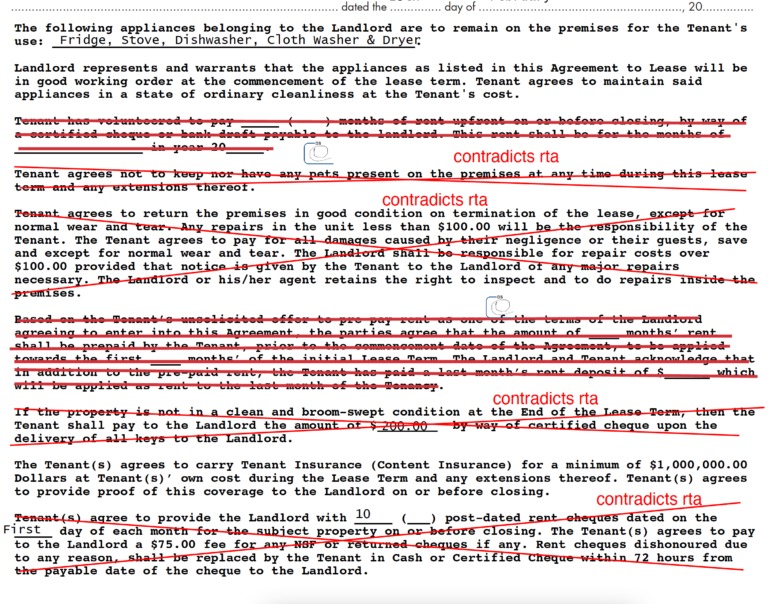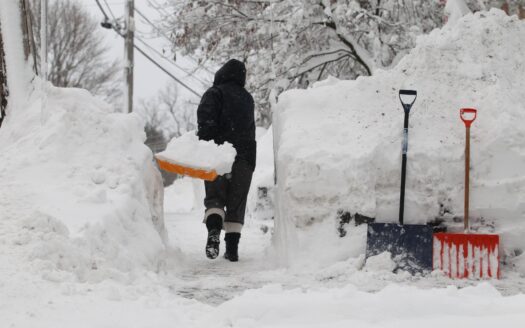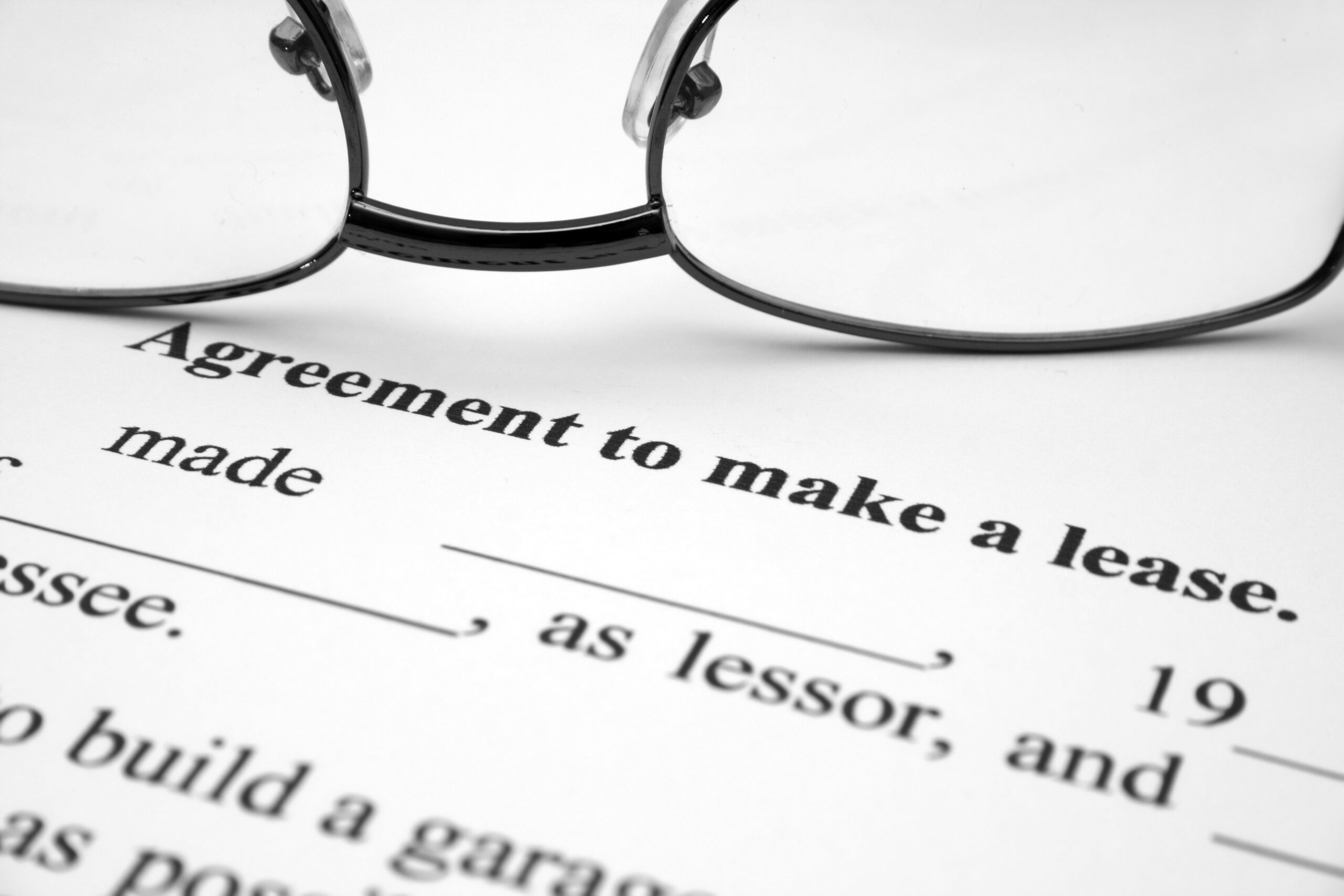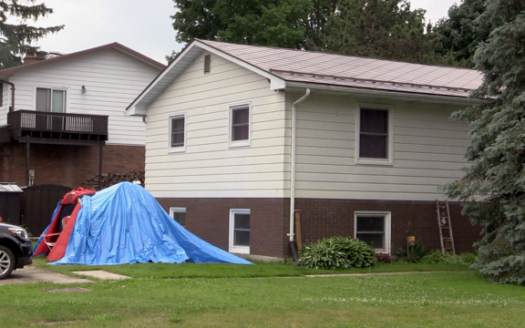Using a Real Estate Agent for a Residential Lease in Ontario
The lack of vacancy of rentals here in Southwestern Ontario puts tenants at what seems like an unfair disadvantage when it comes to lease negotiations. Luckily, when tenants are working with an experienced real estate agent, the playing field is levelled out very quickly.
What? Using a real estate agent to lease a residential property?
Yup, we do that too 🙂
It’s a lot more than just unlocking the door, I have to know my legal stuff too!
This particular part of the lease that we were given to sign had many clauses that contradicted the Ontario Residential Tenancy Act, including:
- Asking for a $300 key deposit
- Asking for a refundable damage deposit of $300
- Requiring that the tenants be responsible for the first $100 of any repair
- A cleaning fee of $200 if the premises isn’t cleaned to the landlord’s liking at the end of tenancy
- Requiring post-dated cheques for payment
- Allowing the landlord to enter the unit “during reasonable hours” as long as some notice is given
- Agreeing that the unit can be considered abandoned if my clients were gone for more than 7 days
- The agreement can be terminated by either party as long as 60 days notice is given
- Rent can be raised with only 60 days notice
I emailed a mockup of the document with all of my changes (aka clauses totally crossed out, word to Kriss Kross) and asked the agent to call me. I was told by the agent that these clauses were completely fine and normal in the GTA.
Huh? Does the province’s rules stop at the Gardiner Expressway?
I asked him how that could be if they directly contradicted the rules that the PROVINCE OF ONTARIO put into play. He seemingly just shrugged it off by saying “this is what our brokerage uses, maybe it’s not what you do in Brantford, but this is what we do in the GTA”
I consulted with my clients, and they decided that this had turned them off of the property so we were on to the next one.
I wonder what the owner of the property would think if they knew that they lost out on potential tenants because of an ill-informed agent?
Why aren’t these clauses allowed?
Deep dive time! Here are the clauses, and the explanation as to why they contradict the Residential Tenancy Act here in Ontario.Asking for a $300 key deposit
The Clause: “The Tenant agrees to provide to the Landlord on or before the commencement of this agreement a refundable key deposit of Three Hundred Dollars ($300) by way of a personal cheque. The Landlord agrees to refund this amount to the Tenant in cash or by way of a bank draft upon the return of all keys/fobs/remotes in good working condition on the last day of the Lease Term.”So a key deposit is allowed (it’s referenced in section 9 of the Residential Tenancy Agreement) but it’s the amount that was the issue here. It was a standard key/deadbolt, so the deposit should only be the cost of the replacement of the key. The cost of replacing keys can vary significantly, starting from as low as $5.00 for a standard key cutting to as high as $300.00 for a complete lock replacement, condominium fob, or key card. This expense can be particularly significant if required as per the condo bylaw. After the keys have been returned in proper working condition, the landlord is obligated to refund the deposit to the tenant(s).
Asking for a refundable damage deposit of $300
The Clause: “… Furthermore, the landlord retains a refundable deposit of $300 to secure the payment of any damages to the property as well as unpaid utility bills and or/ unreturned keys/ fobs by the Tenant….”
Requiring that the tenants be responsible for the first $100 of any repair
The Clause: “Tenant agrees to return the premises in good condition on termination of the lease, except for normal wear and tear. Any repairs in the unit less than $100.00 will be the responsibility of the Tenant. The Tenant agrees to pay for all damages caused by their negligence or their guests, save and except for normal wear and tear. The Landlord shall be responsible for repair costs over $100.00 provided that notice is given by the Tenant to the Landlord of any major repairs necessary. The Landlord or his/her agent retains the right to inspect and to do repairs inside the premises.”If any damages occur due to the tenant’s negligence, they are entirely responsible for covering the expenses associated with the repairs. However, the tenant is not liable for any regular maintenance or other common issues that may arise in any property, such as malfunctioning appliances or plumbing problems. As per the rental laws, the landlord is responsible for ensuring that the rental unit and property are maintained in good condition and comply with all the necessary health, safety, and maintenance standards.
A cleaning fee of $200 if the premises isn’t cleaned to the landlord’s liking at the end of tenancy
The Clause: “If the property is not in a clean and broom-swept condition at the End of the Lease Term, then the Tenant shall pay to the Landlord the amount of $200.00 by way of certified cheque upon the delivery of all keys to the Landlord.”
Requiring post-dated cheques for payment
The Clause: “Tenant(s) agree to provide the Landlord with ten (10) post-dated rent cheques dated on the first day of each month for the subject property on or before closing. The Tenant(s) agrees to pay to the Landlord a $75.00 fee for any NSF or returned cheques if any. Rent cheques dishonoured due to any reason, shall be replaced by the Tenant in Cash or Certified Cheque within 72 hours from the payable date of the cheque to the Landlord.”
Allowing the landlord to enter the unit “during reasonable hours” as long as some notice is given
The Clause: “In addition to the rights provided by the laws applicable to the Province of Ontario, the Landlord or his Agent shall have the right to enter the property at all reasonable times for the purpose of inspecting, and to make repairs and alterations as may be deemed necessary by the Landlord for the preservation of the property and to remove any alterations, additions, fixtures, and any other objects which may be affixed or erected in violation of the terms of this Agreement. The Landlord shall give notice of intent to enter the property except in case of emergency“A buffer of at least 24 hours notice must be given for any notice of entry, and the entry can only be within reasonable hours of the day. The exception to the rule is if it’s an emergency, the landlord (or a repair-person, or someone designated to act on behalf of the LL) can come in to make a repair. Unfortunately the way the clause was worded made it ambiguously vague, but not enforceable none the less.
Agreeing that the unit can be considered abandoned if the tenants are gone for more than 7 days
The Clause: Abandonment is defined as absence of the Tenant from the property for a period of SEVEN (7) days or more consecutive days while rent or any owing monies remain unpaid – whereupon Tenant will be considered in breach of this Agreement. If Tenant abandons the property during the term of this Agreement, the Landlord may enter the property by any legal means, without being liable for such entering, and without becoming liable to the Tenant for damages caused upon entering. Landlord may consider any personal property belonging to the Tenant and left on the property to also have been abandoned in which case the Landlord may dispose of all such personal property in any manner the Landlord deems proper without becoming liable to the Tenant for doing so.Not that my clients were planning on leaving the place unannounced, but this was still against what the act defines as abandoned:
“…Section 2(3) of the RTA provides that a rental unit is not considered abandoned where the tenant is not in arrears of rent. Even if there is evidence of abandonment, such as the furniture being removed, the landlord cannot treat the unit as abandoned before the end of the rental period if the rent is fully paid….”Even if it was a legit abandonment the landlord would need to apply to the Landlord Tenant Board for an “order terminating the tenancy”. The attempts to get a hold of the tenants in this situation must be well documented and through various means of communication. The landlord can’t just throw their hands up and declare it to be abandonment, there has to be an arrears in rent, and cumulative evidence that the tenants are no longer living there.




